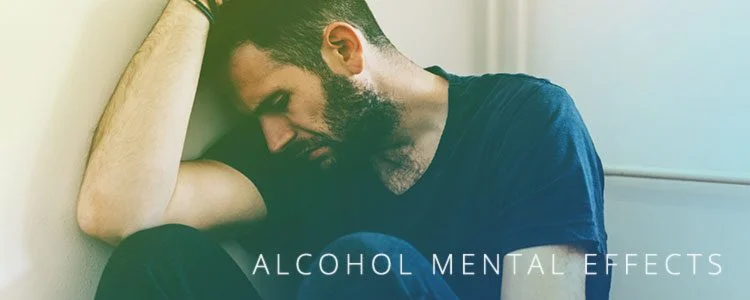27 Best Alcohol and Drug Rehabs in District of Columbia 2025
Searching for drug rehab centers in District of Columbia? Our directory lists 27+ drug rehab centers, including inpatient and outpatient facilities, detox centers, and medication-assisted treatment (MAT) programs to support recovery.
Compare treatment options, locations, and services to find the right facility for your needs. Whether you’re looking for medical detox, behavioral therapy, or long-term recovery programs, explore verified providers in District of Columbia.
Browse the listings below to find the best accredited addiction treatment centers near you and take the next step toward recovery.
27 Treatment Centers in District of Columbia, US

6.91
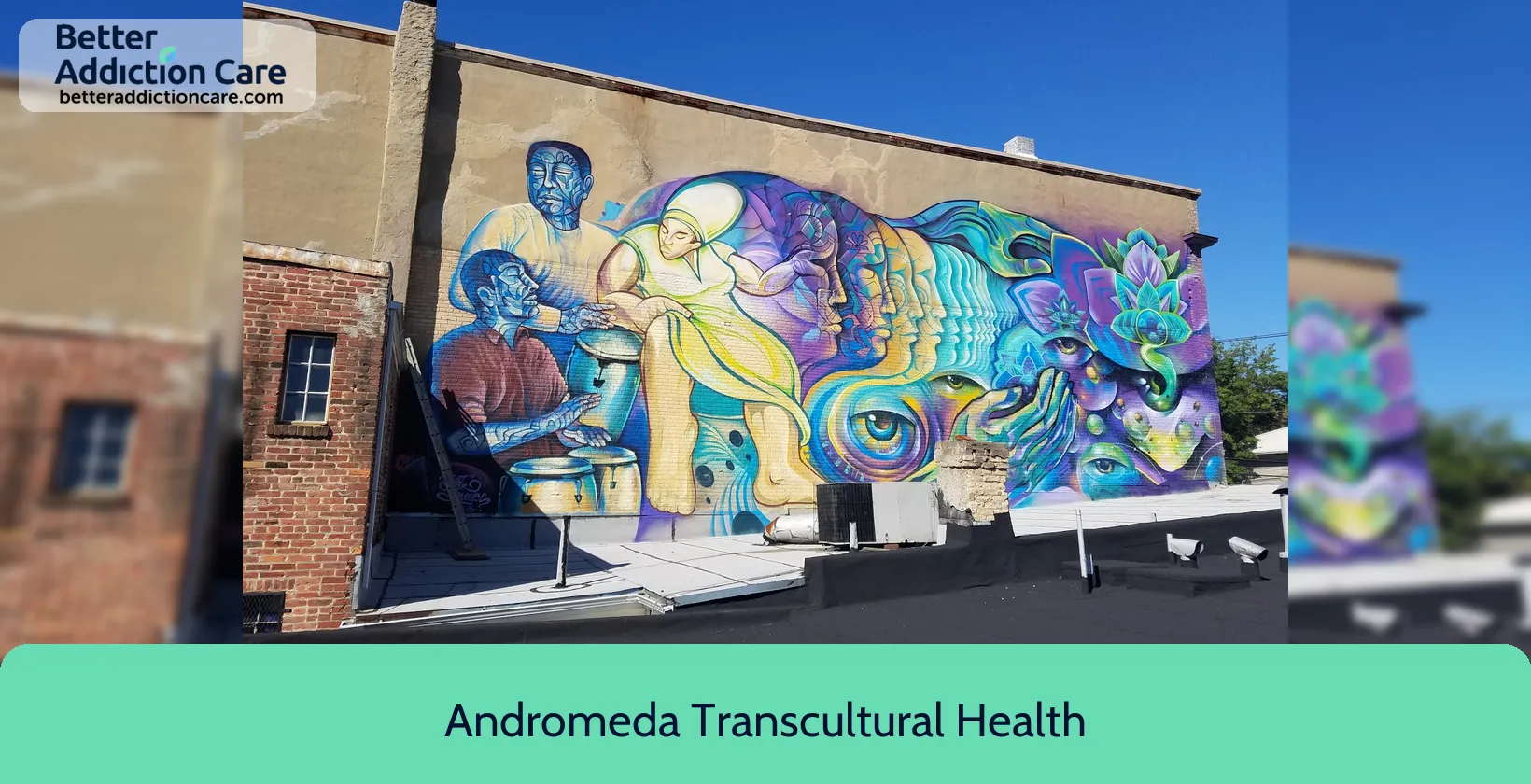
6.94

7.50

7.28

6.56

6.65
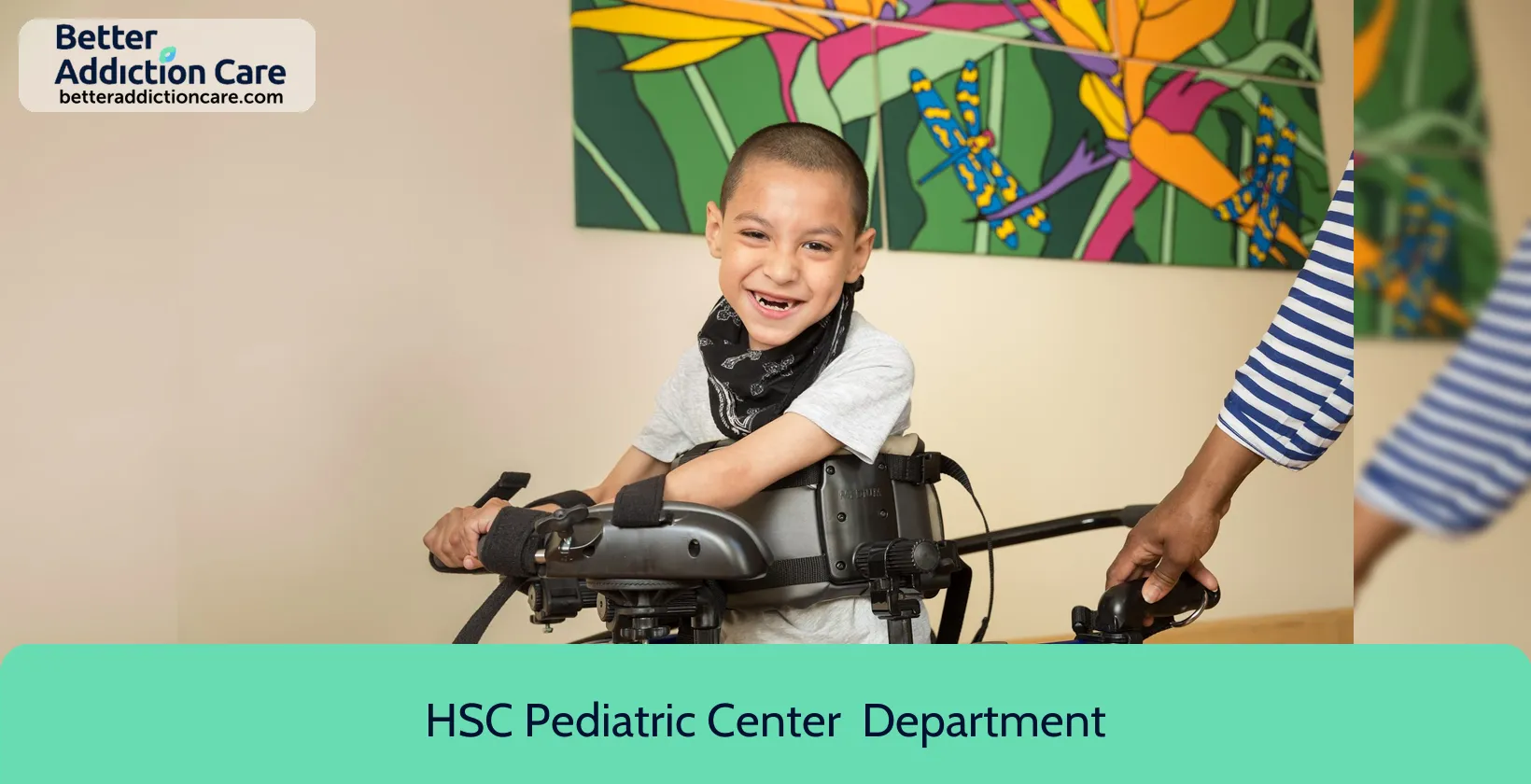
6.59
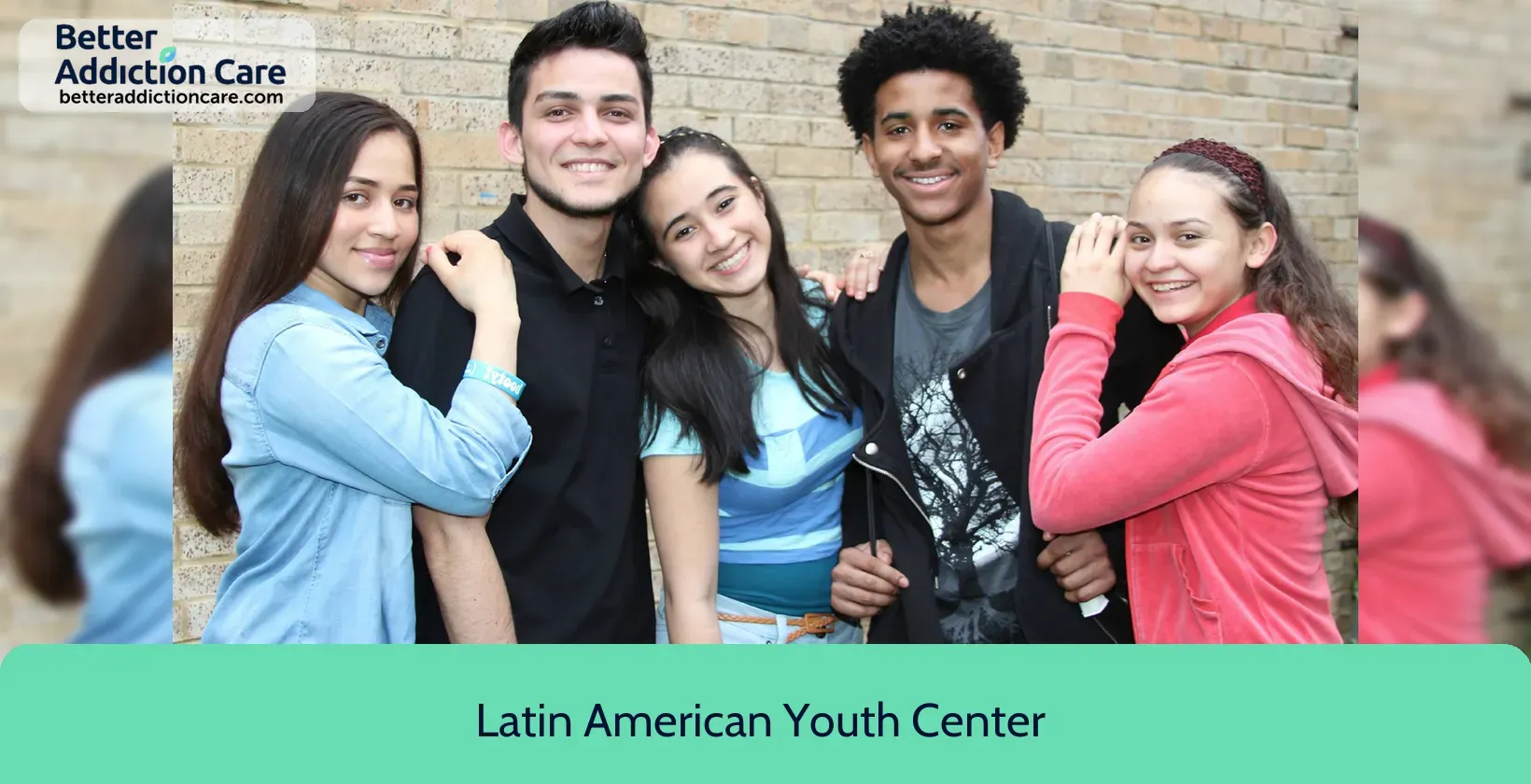
6.89
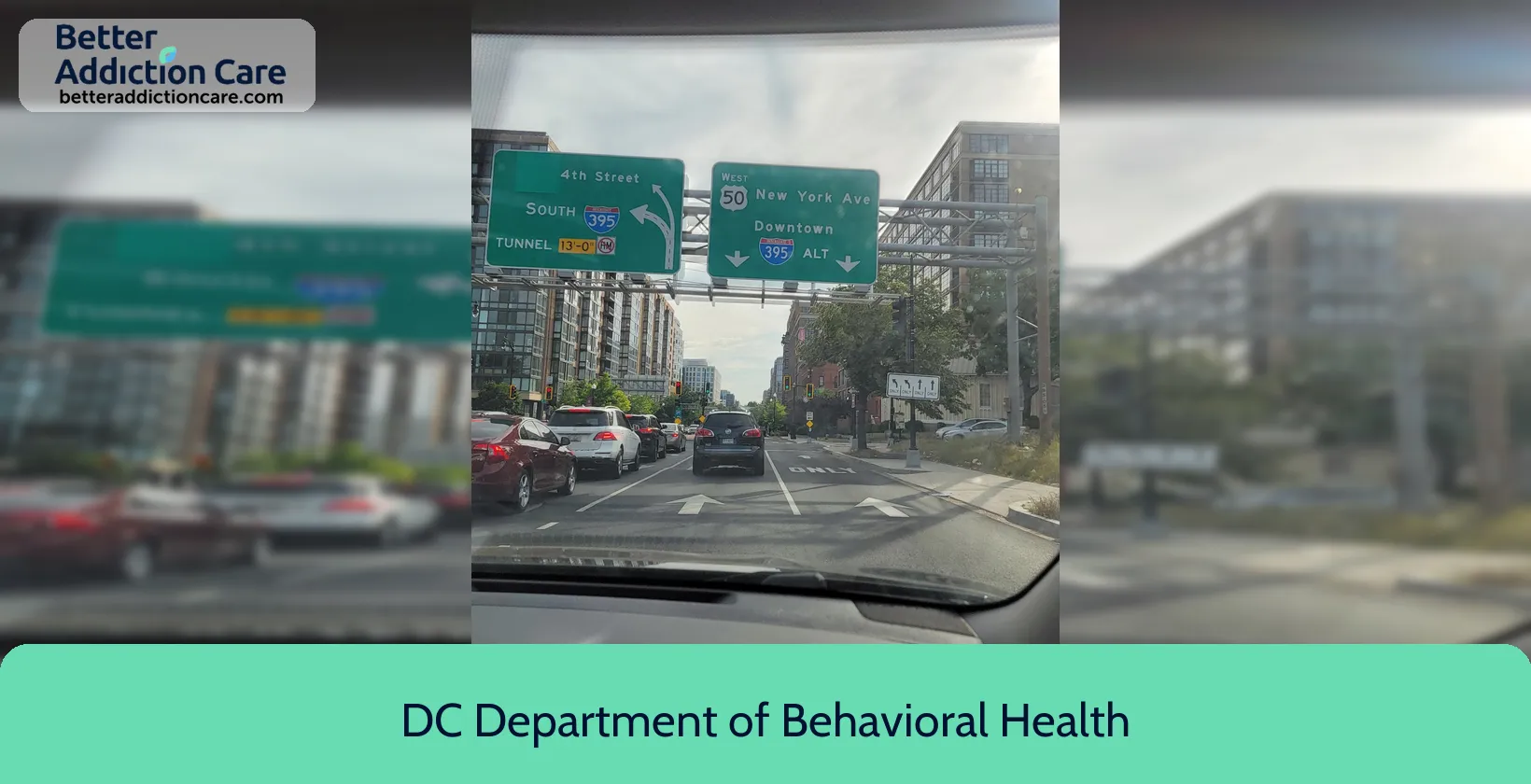
6.65
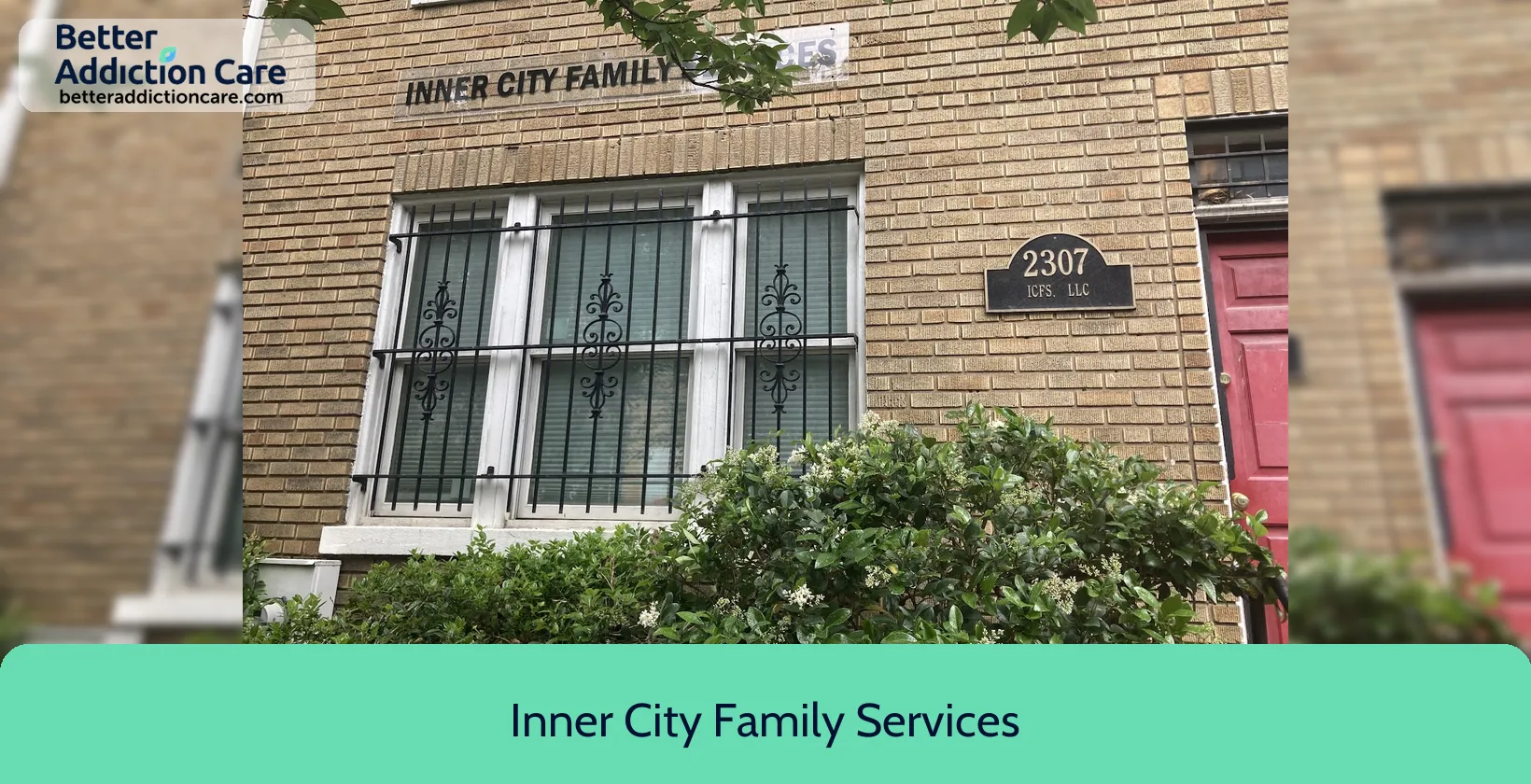
6.71
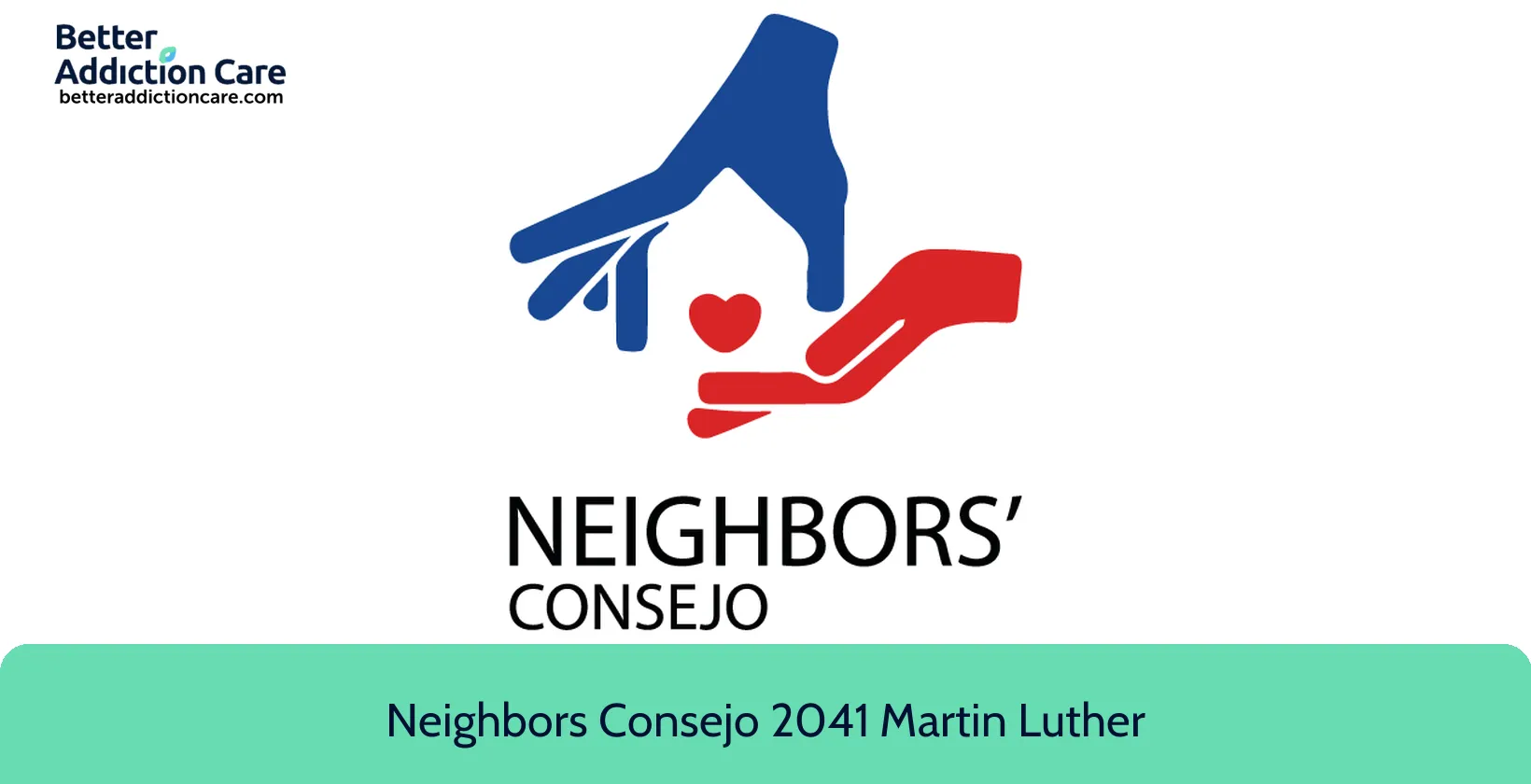
6.56
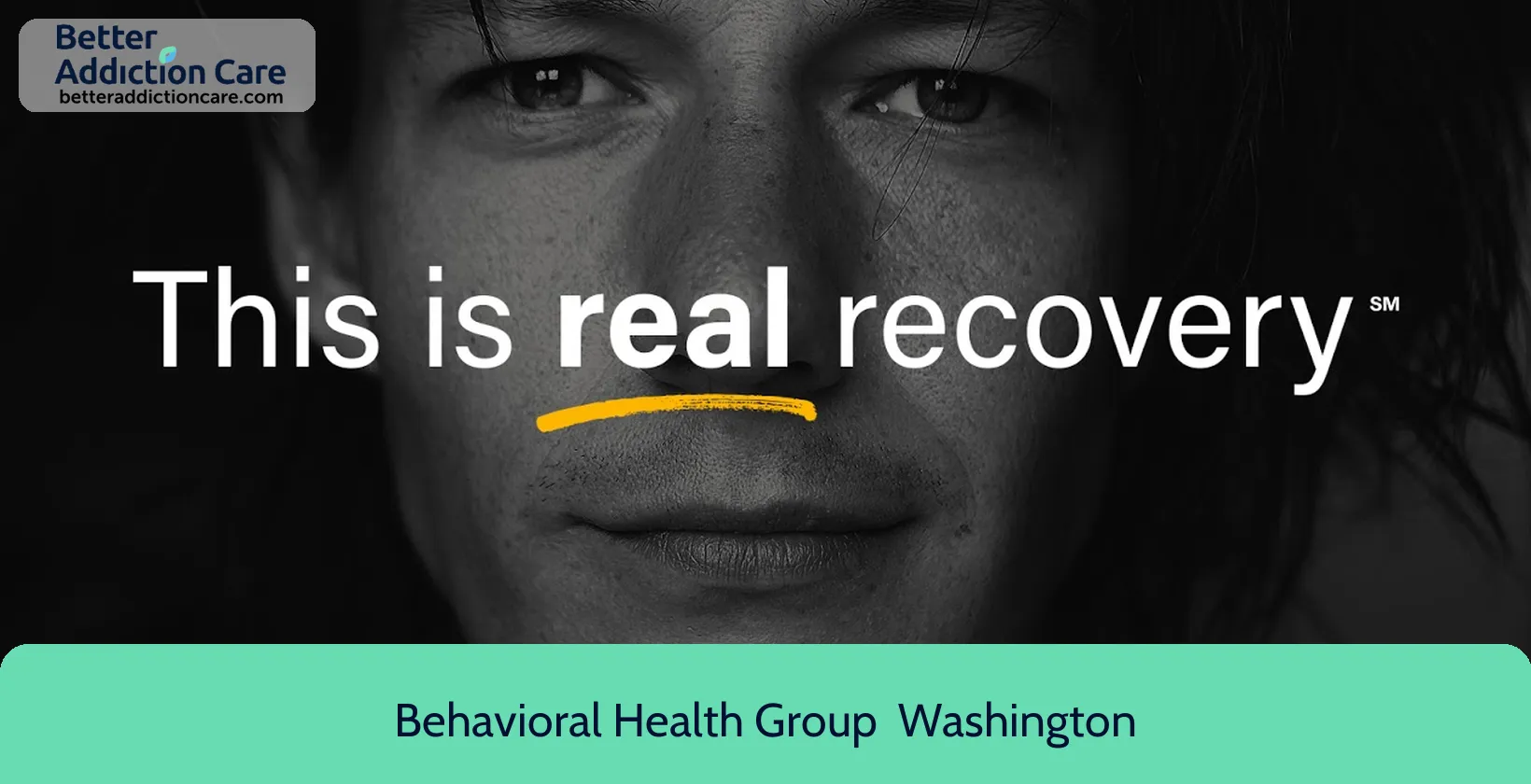
6.93
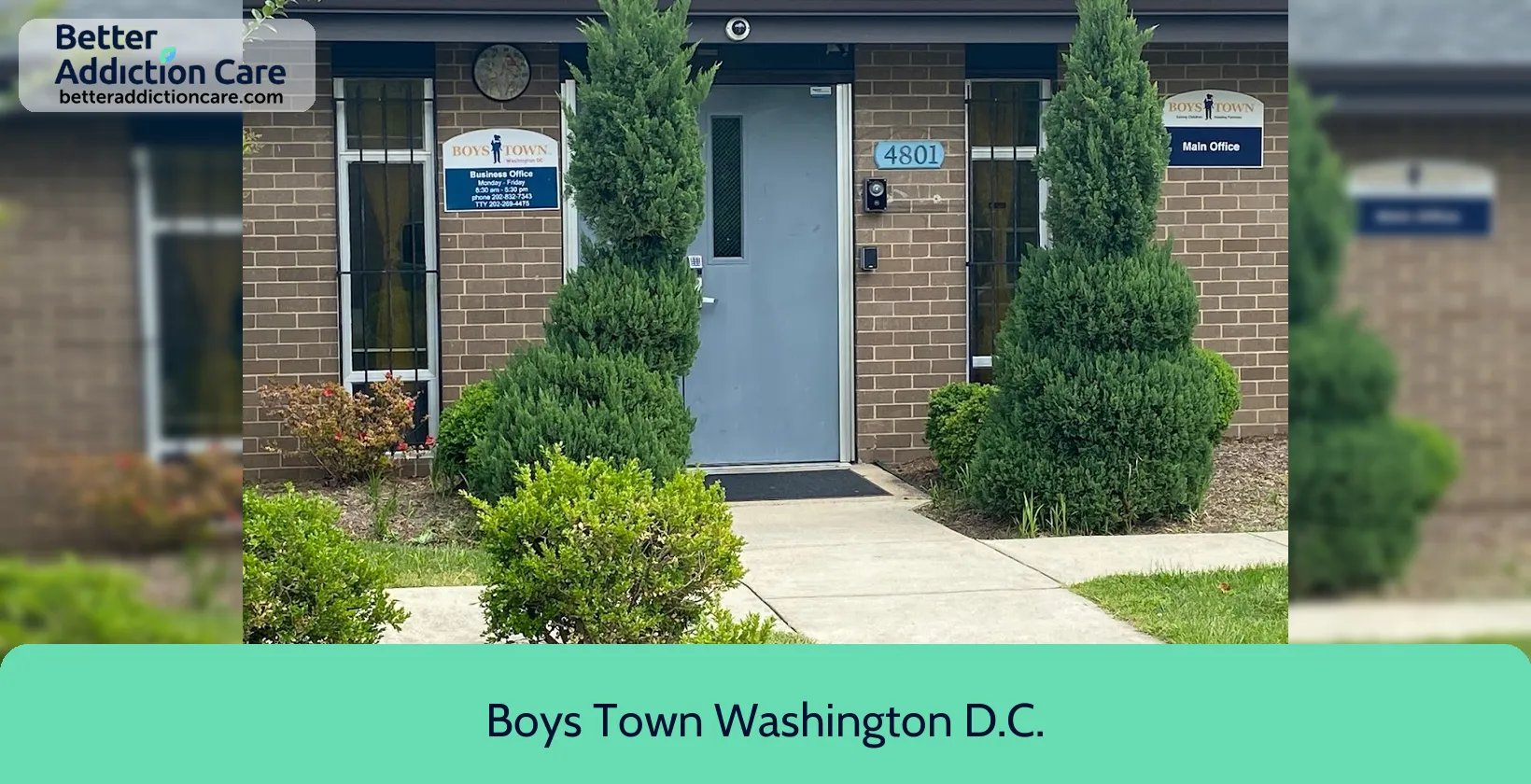
6.56

7.36

7.07

6.82

7.25

6.94

7.80

6.71

6.56

7.28

6.59

7.49

7.03

6.77

6.89
Substance abuse and Mental Health facilities Report for District of Columbia
Cheapest To Most Expensive State Rank
Substance Abuse Facilities
Number of Patients Annually
Annual Enrollments
M
Spent on Outpatient Services (Million)
Avg Outpatient Rehab Cost
Residential Admissions
M
Spent on Residential Treatment (Million)
Residential Rehab Pay (Up To)
Total Patients
Free Drug Rehab Facilities
Alcoholism, Drug Abuse, Mental Health, and Treatment in District of Columbia
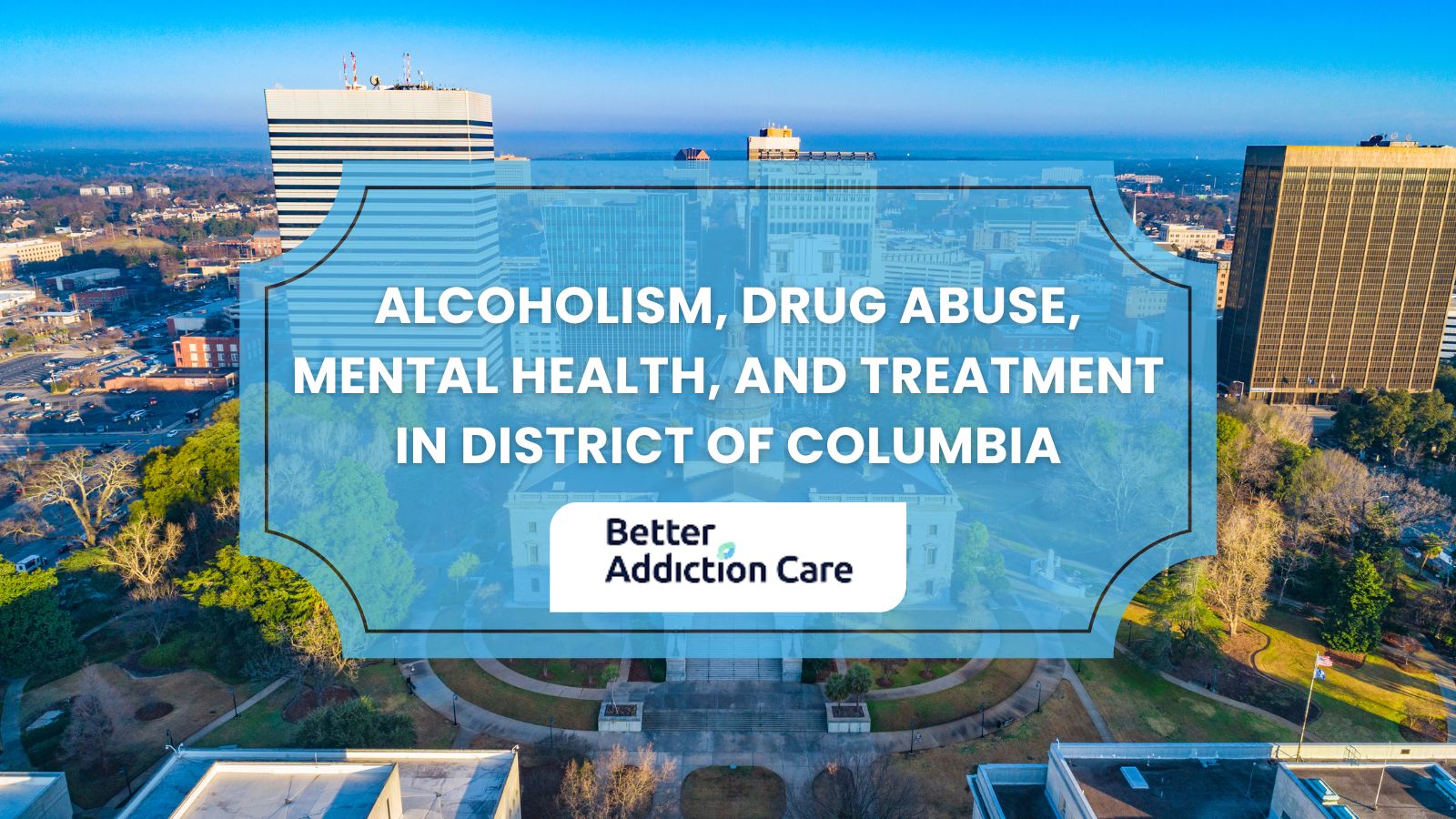
What are the main addictions people in the District of Columbia suffer from?
The main addictions people in the District of Columbia suffer from include:
- Alcohol Addiction: Alcohol Addiction affects 72,000 residents, equating to 10% of the population. Among them, 45,000 men (12.5%) and 27,000 women (7.5%) struggle with this condition.
- Opioid Addiction: Opioid Addiction has deeply impacted the District of Columbia, with 36,000 individuals. It is 5% of the population, including 21,600 men (6%) and 14,400 women (4%). 411 opioid-related overdose deaths reported in 2024.
- Marijuana Addiction: Marijuana addiction among youth aged 12–17 is particularly concerning, with 74,470 people. This equates to 10.8% that reported past-month use, a rate higher than both regional and national averages. This includes 3,800 men (11%) and 3,000 women (10.5%).
- Illicit Drug Addiction: Illicit drug addiction among residents is another pressing issue, with 87,400 people, or 12.13% of individuals, reporting past-month use. This includes 52,440 men (14.5%) and 34,960 women (9.8%).
- Polysubstance Addiction: Polysubstance Addiction involving the combination of multiple drugs, affects 21,600 individuals, or 3% of the population, including 12,960 men (3.6%) and 8,640 women (2.4%).
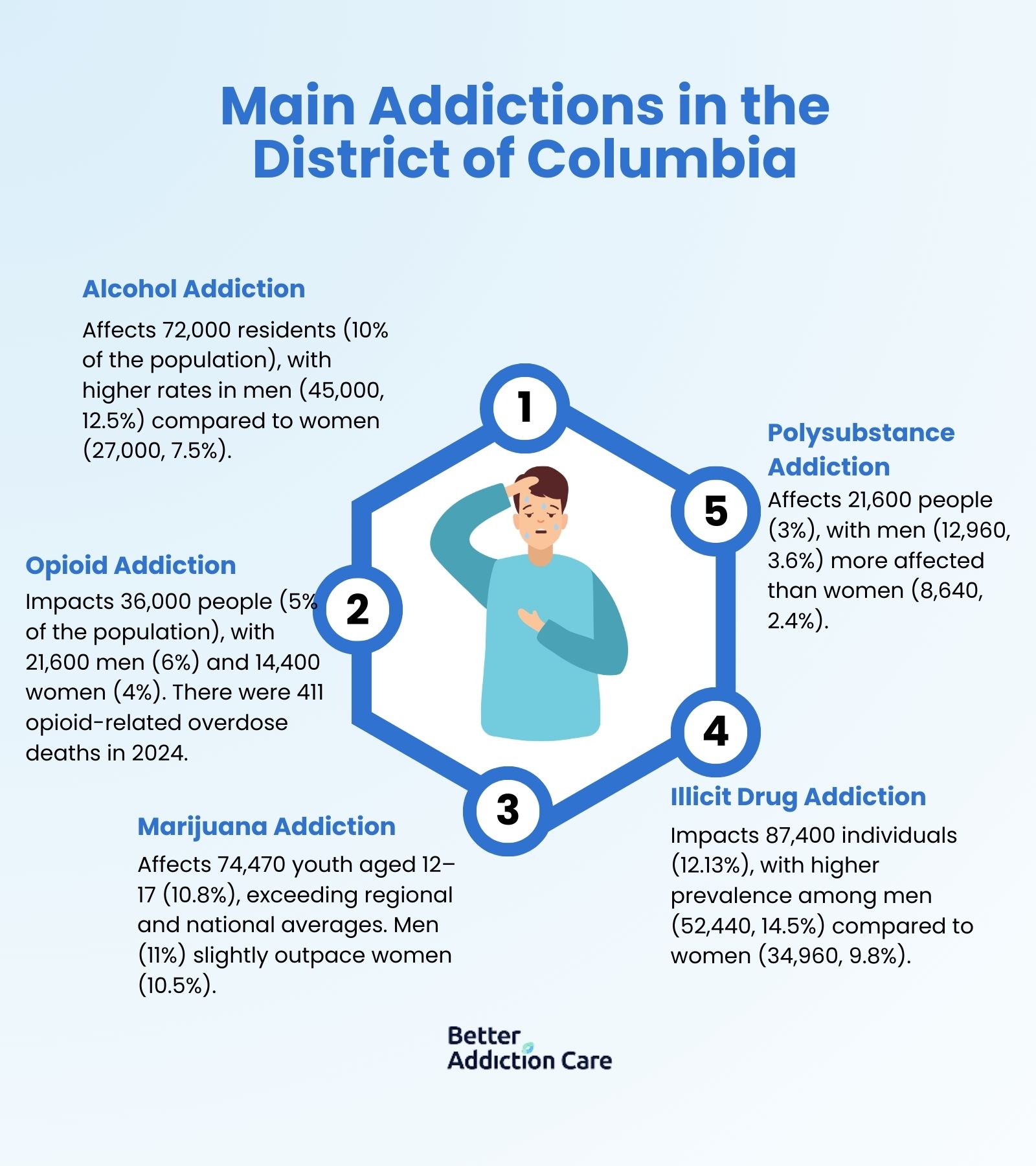
What is the cost of rehab centers in the District of Columbia?
The cost of rehab centers is $66,538 (67.3%). $65,500 (66%) primarily reflecting expenses for standard inpatient or residential programs. Outpatient programs are significantly less expensive, averaging $1,382 (1.5%) per episode.
Several factors influence the cost of rehab centers. The type of addiction plays a crucial role, with treatments for alcohol addiction ranging from $13,650 to $18,000 for a 30-day program, which is 73% to 79.5% less than the average. For opioid addiction, outpatient treatments, including medication-assisted therapy, average $1,382, representing a 97.9% decrease compared to inpatient programs. Conversely, treatment for polysubstance use costs 15% to 20% more, increasing total expenses to $76,000–$80,000. Program duration also affects costs, with extended stays such as 60 or 90 days doubling the baseline, often exceeding $130,000 for inpatient care. The treatment setting further impacts affordability. Outpatient programs are less expensive, $1,382 per episode, whereas luxury rehab centers with upscale amenities charge $100,000 to $150,000 monthly, far exceeding standard costs.
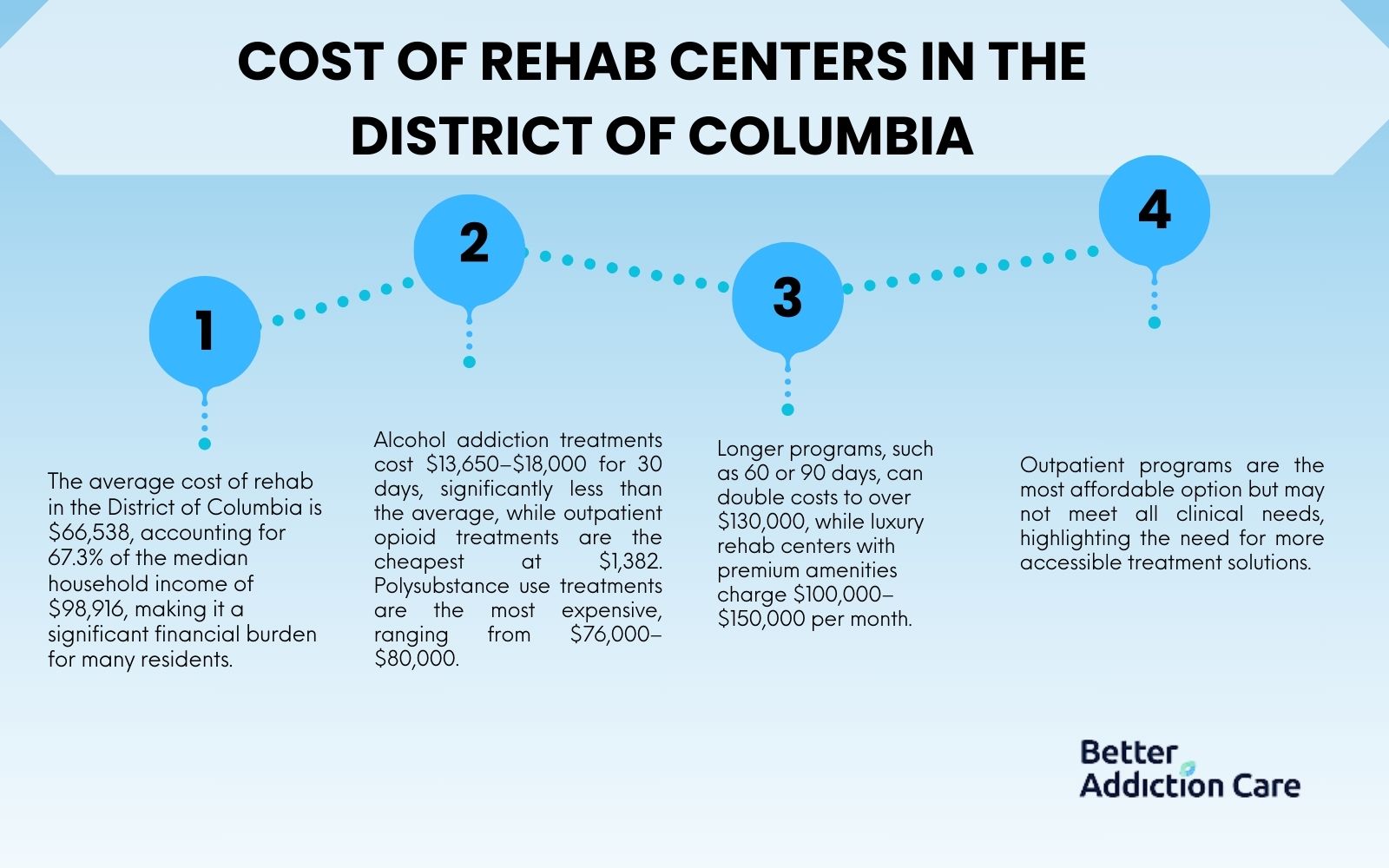
The median household income in Washington, D.C. stands at $98,916, the rehab expense of $66,538 constitutes 67.3% of the annual income, creating a substantial financial burden for many residents. For lower-income households, outpatient options offer a more accessible solution but not meet all clinical requirements. Overall, while the cost of rehab varies significantly based on addiction type, duration, and facility type, affordability remains a critical concern for many individuals and families.
What is the cost of LGBTQ+ rehab centers in the District of Columbia?
The cost of LGBTQ+ rehab centers in the District of Columbia is $63,538 (63.5%). $60,500 (60%) primarily reflecting expenses for standard inpatient or residential programs. Outpatient programs are significantly less expensive, averaging $1,582 (1.5%) per episode.
The specific focus and tailored care provided by LGBTQ+ inclusive programs sometimes increase costs by 10% to 20%, bringing the total to $73,000–$80,000. Factors such as addiction type, program duration, and facility amenities also influence the cost. For example, alcohol addiction treatments range from $13,650 to $18,000 for a 30-day program, which is 73% to 79.5% less than the average, while outpatient opioid treatment averages $1,382, a 97.9% decrease. Treatment for polysubstance addiction increases expenses by 15%–20%, exceeding $80,000 for comprehensive care.
Longer program durations, such as 60- or 90-day treatments, significantly raise costs, often doubling baseline amounts to over $130,000 for inpatient care. The type of LGBTQ+ rehab centers setting further affects affordability, with outpatient programs being more accessible at $1,382 per episode, while luxury rehab centers cost $100,000–$150,000 per month. These pricing figures highlight the financial challenge for many individuals.
The District of Columbia D.C.'s median household income is $98,916. The cost of LGBTQ+ rehab centers is $63,538 represents 63.5% of the median annual income, emphasizing the financial burden such programs impose. LGBTQ+ rehab centers often justify higher costs through specialized services tailored to the unique needs of their clients, offering inclusive care and addressing specific challenges faced by LGBTQ+ individuals. Costs of LGBTQ+ rehab centers vary based on the facility, and prospective clients are encouraged to contact centers directly for precise information.
What is the cost of Faith-Based rehab centers in the District of Columbia?
The cost of Faith-Based rehab centers in the District of Columbia is $59,538 (60.05%). $55,500 (60%) primarily reflecting expenses for standard inpatient or residential programs. Outpatient programs are significantly less expensive, averaging $1,582 (1.5%) per episode.
Faith-Based rehab centers often provide more affordable options, with some offering services at no cost or on a sliding scale based on income. The cost of treatment varies widely depending on factors such as addiction type, program duration, and facility setting. For instance, alcohol addiction treatments range from $13,650 to $18,000 for a 30-day program, which is 73% to 79.5% less than the cost. Outpatient treatments for opioid addiction, including medication-assisted therapy, average $1,382, representing a 97.9% decrease compared to inpatient programs.
Treatments for polysubstance addiction increase costs by 15%–20%, bringing totals to $76,000–$80,000. Program duration is another critical factor, with extended stays of 60 or 90 days potentially doubling costs to over $130,000. Treatment settings also play a role; outpatient programs are the most affordable at an average of $1,382, while luxury rehab centers with upscale amenities cost between $100,000 and $150,000 per month.
The District of Columbia, D.C. median household income of $98,916, the cost of Faith-Based rehab centers is $59,538 representing 60.05% of annual income, highlighting financial challenges for many residents. Faith-Based rehab centers, with their focus on affordability and support, offer a more accessible solution, though costs still vary based on the specific services and facility type.
What is the cost of Men-Only rehab centers in the District of Columbia?
The cost of Men-Only rehab centers in the District of Columbia is $63,538 (63.5%). $60,500 (60%) primarily reflecting expenses for standard inpatient or residential programs. Outpatient programs are significantly less expensive, averaging $1,582 (1.5%) per episode.
Factors such as addiction type, program duration, and facility amenities also influence the cost. For example, alcohol addiction treatments range from $13,650 to $18,000 for a 30-day program, which is 73% to 79.5% less than the average, while outpatient opioid treatment averages $1,382, a 97.9% decrease. Treatment for polysubstance addiction increases expenses by 15%–20%, exceeding $80,000 for comprehensive care. Longer program durations, such as 60- or 90-day treatments, significantly raise costs, often doubling baseline amounts to over $130,000 for inpatient care. The type of Men-Only rehab centers setting further affects affordability, with outpatient programs being more accessible at $1,382 per episode, while luxury rehab centers cost $100,000–$150,000 per month. These pricing figures highlight the financial challenge for many individuals.
The District of Columbia D.C.'s median household income is $98,916. The cost of Men-Only rehab centers is $63,538, representing 63.5% of the median annual income, emphasizing the financial burden such programs impose. Men-Only rehab centers often justify higher costs through specialized services tailored to the unique needs of their clients, offering inclusive care and addressing specific challenges faced by men. Costs of Men-Only rehab centers vary based on the facility, and prospective clients are encouraged to contact centers directly for precise information.
What is the cost of Women-Only rehab centers in the District of Columbia?
The cost of Women-Only rehab centers in the District of Columbia is $55,538 (57.05%). $52,500 (55.0%) primarily reflecting expenses for standard inpatient or residential programs. Outpatient programs are significantly less expensive, averaging $1,182 (1.2%) per episode.
Women-Only rehab centers often provide more affordable options, with some offering services at no cost or on a sliding scale based on income. The cost of treatment varies widely depending on factors such as addiction type, program duration, and facility setting. For instance, alcohol addiction treatments range from $13,650 to $18,000 for a 30-day program, which is 73% to 79.5% less than the cost. Outpatient treatments for opioid addiction, including medication-assisted therapy, average $1,382, representing a 97.9% decrease compared to inpatient programs.
Treatments for polysubstance addiction increase costs by 15%–20%, bringing totals to $76,000–$80,000. Program duration is another critical factor, with extended stays of 60 or 90 days potentially doubling costs to over $130,000. Treatment settings also play a role; outpatient programs are the most affordable at an average of $1,382, while luxury rehab centers with upscale amenities cost between $100,000 and $150,000 per month.
The District of Columbia’s median household income of $98,916, the cost of Women-Only rehab centers is $55,538 represents 57.05% of annual income, highlighting financial challenges for many residents. Women-Only rehab centers, with their focus on affordability and support, offer a more accessible solution, though costs still vary based on the specific services and facility type.
What is the cost of Teen centers in the District of Columbia?
The cost of Teen Rehab centers is $66,538 (67.3%). $65,500 (66%) primarily reflecting expenses for standard inpatient or residential programs. Outpatient programs are significantly less expensive, averaging $1,382 (1.5%) per episode.
Several factors influence the cost of Teen rehab centers. The type of addiction plays a crucial role, with treatments for alcohol addiction ranging from $13,650 to $18,000 for a 30-day program, which is 73% to 79.5% less than the average. For opioid addiction, outpatient treatments, including medication-assisted therapy, average $1,382, representing a 97.9% decrease compared to inpatient programs.
Conversely, treatment for polysubstance addiction costs 15% to 20% more, increasing total expenses to $76,000–$80,000. Program duration also affects costs, with extended stays such as 60 or 90 days doubling the baseline, often exceeding $130,000 for inpatient care. The treatment setting further impacts affordability. Outpatient programs are less expensive, $1,382 per episode, whereas luxury rehab centers with upscale amenities charge $100,000 to $150,000 monthly, far exceeding standard costs.
The median household income in Washington, D.C. stands at $98,916, the Teen rehab expense of $66,538 constitutes 67.3% of the annual income, creating a substantial financial burden for many residents. For lower-income households, outpatient options offer a more accessible solution but not meet all clinical requirements. Overall, while the cost of Teen rehab varies significantly based on addiction type, duration, and facility type, affordability remains a critical concern for many individuals and families.
What is the cost of Young Adult rehab centers in the District of Columbia?
The cost of Young Adult rehab centers in the District of Columbia is $55,538 (57.05%). $52,500 (55.0%) primarily reflecting expenses for standard inpatient or residential programs. Outpatient programs are significantly less expensive, averaging $1,182 (1.2%) per episode.
Young Adult rehab centers often provide more affordable options, with some offering services at no cost or on a sliding scale based on income. The cost of treatment varies widely depending on factors such as addiction type, program duration, and facility setting. For instance, alcohol addiction treatments range from $13,650 to $18,000 for a 30-day program, which is 73% to 79.5% less than the cost. Outpatient treatments for opioid addiction, including medication-assisted therapy, average $1,382, representing a 97.9% decrease compared to inpatient programs.
Treatments for polysubstance addiction increase costs by 15%–20%, bringing totals to $76,000–$80,000. Program duration is another critical factor, with extended stays of 60 or 90 days potentially doubling costs to over $130,000. Treatment settings also play a role; outpatient programs are the most affordable at an average of $1,382, while luxury rehab centers with upscale amenities cost between $100,000 and $150,000 per month.
The District of Columbia’s median household income of $98,916, the cost of Young Adult rehab centers is $55,538 represents 57.05% of annual income, highlighting financial challenges for many residents. Young Adult rehab centers, with their focus on affordability and support, offer a more accessible solution, though costs still vary based on the specific services and facility type.
What is the cost of Luxury Rehab centers in the District of Columbia?
The cost of Luxury rehab centers in the District of Columbia is $120,000 (97.95%). $92,500 (90.0%) primarily reflecting expenses for standard inpatient or residential programs. Outpatient programs are significantly less expensive, averaging $5,182 (5.2%) per episode.
Luxury rehab centers, offering upscale amenities and personalized care, exceed average, with monthly costs ranging from $100,000 to $150,000. The cost of Luxury rehab treatment varies widely depending on factors such as addiction type, program duration, and facility setting. For instance, alcohol addiction treatments range from $15,650 to $20,000 for a 30-day program, which is 77% to 80.5% less than the cost. Outpatient treatments for opioid addiction, including medication-assisted therapy, average $2,382, representing a 97.9% decrease compared to inpatient programs.
Treatments for polysubstance addiction increase costs by 15%–20%, bringing totals to $79,000–$85,000. Program duration is another critical factor, with extended stays of 60 or 90 days potentially doubling costs to over $150,000. Treatment settings also play a role; outpatient programs are the most affordable at an average of $2,382, while luxury rehab centers with upscale amenities cost between $100,000 and $150,000 per month.
The District of Columbia’s median household income of $98,916, the cost of Luxury rehab centers is $120,000 represents 97.95% of annual income, highlighting financial challenges for many residents. Luxury rehab centers, with their focus on affordability and support, offer a more accessible solution, though costs still vary based on the specific services and facility type.
What is the cost of Dual Diagnosis rehab centers in the District of Columbia?
The cost of Dual Diagnosis rehab centers in the District of Columbia is $55,538 (57.05%). $52,500 (55.0%) primarily reflecting expenses for standard inpatient or residential programs. Outpatient programs are significantly less expensive, averaging $1,182 (1.2%) per episode.
Dual Diagnosis rehab centers often provide more affordable options, with some offering services at no cost or on a sliding scale based on income. The cost of treatment varies widely depending on factors such as addiction type, program duration, and facility setting. For instance, alcohol addiction treatments range from $13,650 to $18,000 for a 30-day program, which is 73% to 79.5% less than the cost. Outpatient treatments for opioid addiction, including medication-assisted therapy, average $1,382, representing a 97.9% decrease compared to inpatient programs.
Treatments for polysubstance addiction increase costs by 15%–20%, bringing totals to $76,000–$80,000. Program duration is another critical factor, with extended stays of 60 or 90 days potentially doubling costs to over $130,000. Treatment settings also play a role; outpatient programs are the most affordable at an average of $1,382, while luxury rehab centers with upscale amenities cost between $100,000 and $150,000 per month.
The District of Columbia’s median household income of $98,916, the cost of Dual Diagnosis rehab centers is $55,538 represents 57.05% of annual income, highlighting financial challenges for many residents. Dual Diagnosis rehab centers, with their focus on affordability and support, offer a more accessible solution, though costs still vary based on the specific services and facility type.
Is drug abuse and addiction a problem in the District of Columbia?
Yes, drug abuse and addiction is a problem in the District of Columbia. The region of Columbia faces high rates of opioid-related overdose deaths, with 461 fatalities reported in 2024, averaging 38 deaths per month. As of 2024, 345 opioid-related fatalities have already been recorded. Substance use disorders are prevalent, affecting 60,000 residents, or over 10% of the population. Alcohol addiction also affects one in ten residents, a rate twice the regional and national average.
Data from the National Survey on Drug Use and Health indicate that youth substance addiction is another concern, with marijuana addiction among individuals aged 12 to 17 in the District surpassing the national average. Statistical evidence highlights worsening trends, particularly in opioid-related overdoses, which have increased significantly over the years. While efforts to address these challenges continue, the persistent high prevalence of drug abuse and addiction and youth drug use reflects the ongoing struggles in combating addiction in the District of Columbia.
Is alcoholism a problem in the District of Columbia?
Yes, alcoholism is a problem in the District of Columbia. 10% of residents suffer from an alcohol addiction, a rate that is twice the regional and national average. Additionally, 22.5% of adults in the District of Columbia engage in binge drinking at least once per month, which is higher than the national average. Alcohol-related deaths have also risen in the District of Columbia, with the rate of increase surpassing any other U.S. state. In 2024, the District's per capita annual alcohol consumption was more than 10% above the national level, reflecting sustained high levels of alcohol use. These trends of high levels of alcohol use underscore the growing public health challenges posed by alcoholism in the District of Columbia.
Is Mental Health a problem in the District of Columbia??
Yes, mental health is a problem in the District of Columbia. 26.63% of adults in the District of Columbia experience mental illness, a rate higher than the national average of 23.08%. Among adolescents aged 12–17, 16.02% have experienced a major depressive episode, highlighting substantial mental health challenges among the youth. The District of Columbia also reports elevated rates of substance use disorders, which are closely linked to mental health issues, exacerbating the overall burden. Over the years, the prevalence of mental illness among adults has consistently remained above the national average, while youth depression rates have shown an upward trend, reflecting growing concerns about the mental health of younger populations. These upward trends of growing mental illness emphasize the critical need for enhanced mental health resources and interventions in the District of Columbia.
Can you travel to the District of Columbia for rehab?
Yes, you can travel to the District of Columbia for rehab. Firstly, the District of Columbia offers a wide range of rehab centers, including luxury, LGBTQ+, teen-specific, and faith-based programs, providing tailored treatment options to meet diverse needs. Secondly, the District of Columbia is home to top-tier healthcare facilities, enhancing the quality of care and access to specialized medical professionals for co-occurring conditions. Thirdly, its robust support networks, including local recovery groups and professional counseling services, create a supportive environment for long-term recovery, making it an excellent destination for rehab.
Can addiction be treated in the District of Columbia?
Yes, addiction can be treated in the District of Columbia. Firstly, the region of Columbia is home to a wide variety of rehab centers, including inpatient, outpatient, and specialized programs tailored to different populations such as teens, women, and LGBTQ+ individuals, ensuring personalized care. Secondly, the facilities of rehab utilize advanced, evidence-based treatment methods, including medication-assisted treatment (MAT), cognitive-behavioral therapy (CBT), and holistic therapies to address both the physical and psychological aspects of addiction.
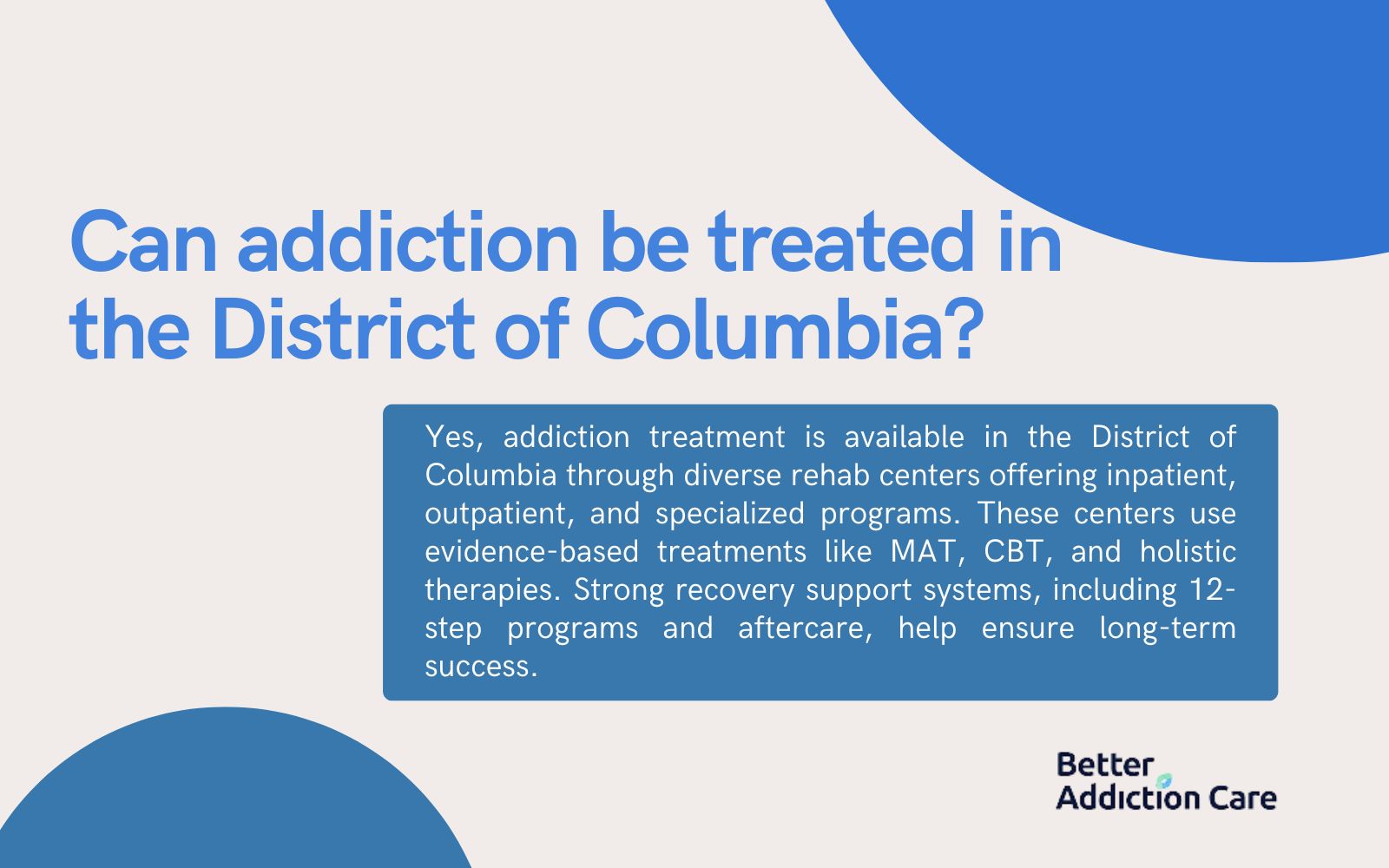
Thirdly, the District of Columbia boasts strong recovery support systems, such as 12-step programs, peer support groups, and comprehensive aftercare planning, all of which enhance the chances of sustained recovery.
What is the state of the District of Columbia?
The state of District of Columbia, commonly known as Washington, D.C., is a federal district and the capital of the United States. It is not classified as a state. It has a population of 678,972 as of 2024, with 47.7% male (323,906) and 52.3% female (355,066). Geographically, it is located on the eastern seaboard, bordered by Maryland to the north, east, and southeast, and Virginia to the south and west, with the Potomac River forming much of its southwestern boundary. Economically, the District of Columbia is one of the wealthiest regions in the United States in terms of GDP per capita, driven by its concentration of government agencies, international organizations, and private businesses. The median household income is $98,916, above the national average. However, economic inequality remains a challenge, with 13% of residents living in poverty, reflecting a region of both affluence and financial disparity.
What is the population of the District of Columbia?
The population of the District of Columbia is 670,587 residents. The gender distribution consists of 320,797 males (47.84%) and 349,790 females (52.16%), reflecting a slight female majority. Age-wise, the population skews relatively young, with the largest age groups being 25 to 29 years and 30 to 34 years, comprising 11.17% (74,883 individuals) and 11.55% (77,462 individuals) of the total population, respectively. Other significant age groups include 20 to 24 years (6.75%, or 45,253 individuals) and 35 to 39 years (9.14%, or 61,288 individuals). Younger age brackets, such as under 5 years, account for 6.19% (41,522 individuals), while older groups like those aged 85 and over represent 1.52% (10,167 individuals). These age figures underscore the District of Columbia’s youthful demographic profile, with the majority of residents concentrated in their prime working and early family-building years.
What is the income of people from the District of Columbia?
The income of people from the District of Columbia is $78,479, per capita income, which is 1.3 times the amount in the Washington-Arlington-Alexandria, DC-VA-MD-WV Metro Area ($61,464) and more than 1.5 times the amount in Virginia ($48,689). The median household income stands at $98,916, 90% of the amount in the Washington-Arlington-Alexandria, DC-VA-MD-WV Metro Area ($121,469) and 20% higher than the amount in Virginia ($89,931). Income distribution varies across age groups and genders, with younger individuals earning less than those in their prime working years, and disparities existing between male and female earnings. For instance, the total population of civilian employees aged 16 years and older in the District is 373,967, with median earnings of $73,066. Women in the District earn 85% of men's earnings.


